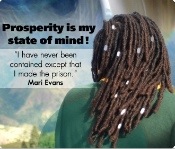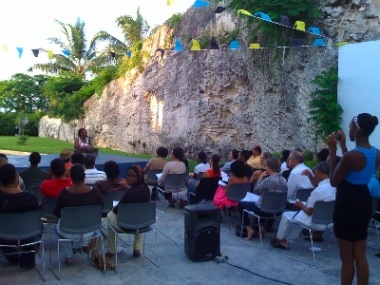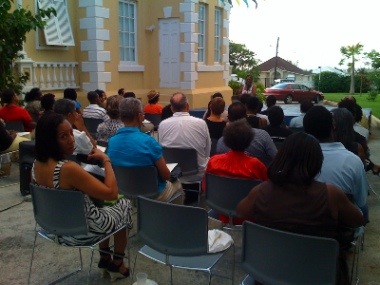I only began to touch on the reasons for my not agreeing entirely with Ward on his assessment of the theatre industry here in The Bahamas. To recap: his take on things proposed that the surest way for any writer to make a living at writing creatively in our country is to do it for theatre. He offers these arguments in his defence:
- Up front costs for the producer-writer are less than production costs of a feature film.
- Audiences for popular shows are immediate and probably larger at one time than audiences for films.
- Selling out shows - playing to packed houses - will give you the kindof return on investment that is needed to maintain viability.
and
- Formulaic writing will ensure the returns for the playwright's investment.
(Ward, correct me if I'm offbase here -- this post has been some time in coming and I may have forgotten details, but it seems to me that these are the basic premises you put forward.)My problem in jumping on his bandwagon regarding the rewards adhering to writing for the stage in The Bahamas involve most particularly the fact that theatre (in all its forms -- dance, opera, and drama) cannot take place on its own. Of all the arts, it is the most collaborative. Oh, sure, you can say that film is collaborative too, but it is quite possible for an individual to make films; BIFF is full of them, documentaries that rely on a single camera, a single person, and a catchy subject. The fact that film is a medium that records and plays back (and is therefore infintely portable, theoretically, and therefore able to generate revenue from many markets, not just one) is one of the most liberating aspects about it; and if one wants to make a living as a documentary filmmaker, in The Bahamas or anywhere, I would argue one can do so. In fact, the more exotic the topic the better in most documentaries, so perhaps The Bahamas provides the perfect palette for the filmmaker. We're as exotic as they come, our aspirations notwithstanding.But theatre? Can that exist without collaboration? I'd say not. At the very very least, the artist needs an audience. Usually the artist also needs a whole heap of other supporters as well: technicians to handle light and sound, people to assist backstage, people to sell and market the show, and so on. It is indeed possible for a multi-talented individual playwright to do all of that himself. But easy? No. And not even preferable. The energy required to perform to the audience's satisfaction is far better concentrated on performance, not on hustling and promotion and production. Michael Pintard's success has, ironically, led to his retirement from the stage; he works behind the scenes, while he hires people to deliver his words. Terez Davis, on the other hand, has a business partner who helps her to manage the publicity and dull stuff to allow her to slip into the character of Daisy and remain in front of the audience.So the centrality of collaboration that lies at the heart of theatre, which gives theatre its peculiar power, is also what makes it oddly less able to sustain a long-term living for its practitioners. The revenue might be enviable, and come in all at once. But nobody seems to consider the overheads that are incurred -- or that they have to be spent before the revenue comes in, on faith as it were. One might say that this is not so different from film, and one would be right. But the immediacy of theatre also lends it an urgency that film does not share. Film records and retains, and its preparation can be done in stages over long periods of time. But theatre? The alchemy that drives performance -- especially performance of the part-time community variety -- has an expiry date. When people do not have the luxury of full-time engagement with the stage, their energy comes from a number of sources -- the freshness of the material, the chemistry of the cast, the response of the audience. It's possible, when people are fitting their performances around their everyday lives, for a show to peak and to taper off. Where there is no extensive community of ongoing classes, courses and workshops and no time to engage in them if they do exist, part-time performers find it more difficult to keep things new and exciting, and shows can go stale over time. And so in the kind of theatre that exists in The Bahamas, productions have an optimal rate of investment and return. And as live performance is variable, and unpredictable, that rate will vary over time.In order to make money off your writing, Ward argues, you need to find a formula and stick to it. In order for your writing to be viable, to sustain you, the formula will suffice. This formula will find a ready audience, will allow for a stability of expenditure and revenue that, once it's been fine-tuned and located in fairly predictable spaces (like James Catalyn and Friends' relation to the Dundas), will work. And he's right, as far as it goes. My objection comes from the idea of sustainability. The problem with formulae is that they are boring, especially in live theatre. They can work fine day in day out on apparently "free" media like television, because there's no effort involved in consuming them; they can also work fine in film, because most blockbuster films have the money and clout behind them to create a demand among audiences who might not otherwise be interested in them. But in live theatre? Not so much. I would argue that the formulae that he extols would begin to pale, to taper off, if they had to run day after day after day, if they were mounted on a monthly basis, if they were produced in the kind of time frame that would allow for real sustainability. Even Pintard's shows have expiry dates. Even Summer Madness has a season -- the end (and in good years the beginning) of Summer.No. If we're looking for formulae, I would argue that the true measure of sustainability in contemporary Bahamian theatre lies elsewhere: in Thoughtkatcher's Da Spot, which sustains audiences for weekly performances over two or three months (again, a season), perhaps precisely because it's improv, because of its unpredictability. There is a formula, true, but it's not the writer's formula. It's the performer's, and audiences go back because they never know what will happen next.Or perhaps the other formula that was truly viable and which could be maintained over time was the formula practised by the Dundas Repertory Season between 1981 and 1999, and which allowed for the production not only of formulaic comedy shows but for plays, musicals, new shows and old. That season ran from January to May, and ran a rotation of shows, a different one every month, during that time. Some shows made money, and some shows lost, but for 17 of its 19 years the season never made a loss. The revenue from the season sustained the Dundas and paid directors and technicians (though not actors or backstage crew). And unlike the formula proposed by Ward, the revenue didn't rely on meeting the audience's demand. Rather, it depended (like Hollywood and other truly successful art forms) on having the audience discover a demand for things it never knew it liked before, and thus laying the foundation for future sustainability -- the possibility for growth.So what am I saying? Perhaps I'm agreeing now with Ward -- that theatre allows the Bahamian writer her best chance for making a living. Well, I don't know about that. The whole secret of the Season's success was that it served up a variety of shows for a wide range of audience tastes, and therefore didn't depend on a single writer. But it also spawned a whole crop of new writers as well -- who didn't necessarily make a living off their plays, but who were nevertheless able to write what they were called to write without tailoring it overmuch for an "audience" that they knew only imperfectly. But I am conceding that it may be possible to sustain your living by writing for theatre -- but only if you recognize the need for collaboration, understand that theatre cannot happen with one person alone, and -- perhaps most important -- have the ability to access performance spaces that allow for viability to happen, that are not so prohibitive in their overhead that all one's revenue goes into paying the rent.





